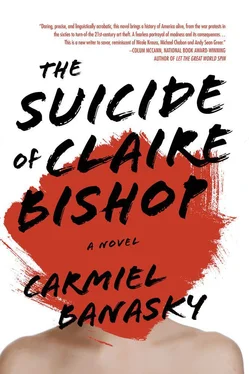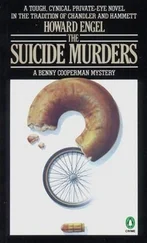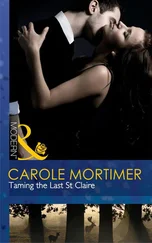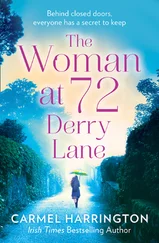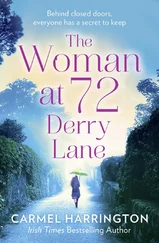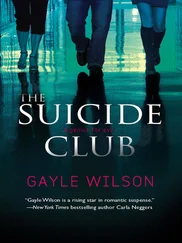Somewhere, Claire still had the postcard Mary had sent, saying she and Leo were living with the politician in Arizona. Arizona . It could have been some fantastical land with harpies and dragons. Claire had written often those first months. Mary had been apologetic at first, but later she implied she feared for Claire’s mental health. Mary told her not to write again. Claire used to invent scenarios in which she sent anonymous letters to the press full of ammunition against the congressman.
No, Claire did not have a singular, all-powerful moment. She was not, after all, a character from a romance movie forever bound to some sunset kiss decades prior, the man allegedly killed in war, his body never found.
Her fingers sang with cold as she scooped the snow and she watched them turn a bright red. Then her hand scraped against something not-snow. She put the pot aside and dug a little more. Fabric. White cotton wet through. Elsa’s dirty clothes were spread and buried in the snow. A nightgown, several pairs of underwear, a blue housedress, nylons. When had she done that?
Claire imagined Elsa sneaking outside in the middle of the night with an armload of laundry. In her moonlight escapade, Elsa was accompanied by strange shapes floating around her feet — Elsa’s disembodied memories, dropping right out of her mind, entities of their own. They weren’t like film projections of her life; outside of Elsa, they became mere blobs, unable to take form and survive. They walked lightly over the layer of snowice, fluid as bird shadows.
She tried to imagine her own grief in the same way. She stayed crouched and cold in her wet slippers, her knees pushed up against her bra-less chest, glancing at the footprints circling the house, part of some constellation she couldn’t see from inside it. She shouldn’t have let herself think of Mary like she had been. Now she missed her. She missed her badly, and what was she supposed to do with that? When she missed Mary, she was as functional as the broken, wheezing pipe. If she could just eject it from herself, if she could will her grief out of her mind, it might hover nearby, insisting by its mere presence near the porch that it had once existed inside. But it would have no power otherwise — a filmy reminder of something once felt. Her and her mother’s memories, trotting side by side, midnight sentinels leaving tracks in their wake. No wonder she’d never seen what creature left those prints.
“Claire? What are you doing out here? And dressed like that?”
For one bizarre, frightening moment, she thought it was her father. But she knew it was Michael before the thought was complete. As if he could smell trouble, he’d arrived to help.
“You’ll catch your death,” he said.
Claire laughed — what could she say, caught outside in her night-gown? — and handed him the potful of snow. She let him put his arm around her and lead her inside, looking around as if to avoid stepping on the shadow-shapes.
As Michael tied burlap bags around the pipe under the sink, she told him about Elsa’s delusion, or most of it. He listened — he was good at that — and said there was no right or wrong, she had to feel out each situation. She used a hairdryer to warm the pipe.
Claire had begun looking forward to Michael’s visits. They provided structure. She always had him stay for a meal, and he complimented her cooking. He told her stories about the other unfortunate people he took care of, always worse off, and made Claire promise not to repeat a word or he’d be toast. She laughed at those other patients, and it was good to laugh.
He found other chores to do that day, like cleaning out the fireplace. When he was done, he kissed Claire on the cheek as if he’d been doing so for years, and whispered, “City girl,” in her ear. His face turned a shiny red when he pulled away, as if he realized what he’d done only then. Claire could not hold back an expression of amusement. Elsa was fidgeting in her armchair. When they turned their attention to her, she threw the box of Kleenex and hit Michael in the shoulder. Tissues flew, the biggest snowflakes. Claire laughed. Michael didn’t react at all.
As Claire picked up the tissues she said, “Did you know my parents when they were younger?” He’d lived in Ovid most of his life.
Michael bent to help. “I met them a few times. They used to come into the bookstore where I worked. Your mother was, back then, she was…” He trailed off and stalked around looking for more fallen tissues though there were none. But Claire knew what he wanted to say — something true and mean. Elsa had always been callous, especially to strangers (reserving a different kind of awful for Claire and her father). It had always made Claire love her father more, the way he loved Elsa without flinching. It never made him seem weak.
Michael was not that type of strong. When he left, Claire threw a couch cushion hard down the hallway and it hit the front door. The little bells chimed. She felt foolish — for the cushion and for him. She would never apologize for Elsa.
The sky was vein gray. The day had shaken off all pretense of beauty; now it was only wet and frightening, an uneven snow falling. There was a low light. Not yet sunset. But cooped up as they were, fresh air sometimes took precedence over the cold.
On the front porch, Claire ducked Elsa around the low-hanging icicles and marveled at the slow-growth weapons. The top of one was thicker in diameter than Claire’s own torso. Eventually they would fall, when the thaw came. They would hurt someone.
Here was everything: the dark-white sky; the yellow kitchen light thrown on the snow so that it looked, briefly, like sand; the wiry trees; the sound of their weight making the snow ache out a low groan. Walking down the road, they passed other lonely homes, no people in the windows.
“If you want to marry that man,” Elsa interrupted the quiet, “it won’t be under my roof.”
“Excuse me? What man am I marrying?”
“The turtle man. He’d have the run of things. I can’t have that.”
“I’m not marrying Michael,” Claire said. “Where did you get an idea like that?”
“Well you better marry someone or the whole town will think you’re loose.”
“Thank you. I’ll get right on it,” Claire said. Elsa only snorted in retort. “What do you want for dinner? It can’t be anything that needs much water. The pipe is still thawing.”
“Swordfish,” Elsa sounded out slowly.
They stopped in front of a meadow they passed often on their walks but never dared to enter: the trespassing signs, the decayed hunting stands. Stretches of blank white land reached out blindly, heaped like goose down. The sun was ending and from the edges of the meadow, lean tree shadows stretched endlessly across the snow.
Elsa was shivering now, but she didn’t complain. All Claire had to do was provide a stable, supportive environment. That’s what Michael coached her to do. And yet both of them knew she would fail.
A dark something darted in the corner of her eye. There — a rabbit, the size of her head. It bounded along the edge of the meadow.
“I suppose it wouldn’t kill us to have leftovers again,” Claire said. Elsa stared back at her blankly, perhaps a little frightened.
The thought took hold of her now that Elsa could be anyone. She knew so little about her own mother for certain. She knew Elsa was a widow, a mother of one, a retired seamstress, a housewife, a patient suffering from Alzheimer’s. She liked butter beans best, put them in everything when Claire was growing up. She had always been curt with people, which had embarrassed Claire. She was a Republican, and a fan of German music. She loved, for some God-awful reason, neon signs — even threatened to buy a personalized one for the kitchen — and yet she hated New York City. She preferred abridged Bible stories to the real thing. She used to yell. And now she hardly spoke and was a stasher of clothes in snow. It was not much to go off of, tallied like that.
Читать дальше
